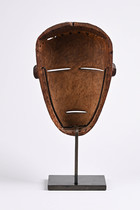Masque d´ancêtre féminin "pwevo" ou "mwana pwevo" · Angola, Tchokwé · ID: 3049728
Kevin Conru, London, Great Britain
Description
wood, red pigment, base
Female ancestral spirit masks of the Chokwe represent the ideal woman. They are either conceived as mature, adult woman, called “pwevo” (or “pwo”), or as a younger female called “mwana pwevo” (or “mwana pwo”).
They perform at the “mukanda” initiation of young boys, together with their male counterpart, the “cihongo” mask. Their dances characterise the important social role of women in Chokwe society and are intended to teach the young girls the code of conduct of a Chokwe woman.
Although the masks are female and are meant to convey the ideal female role model, they are danced by men. The dancer’s body is wrapped in a net-like costume, and he wears wooden breasts and rattling objects around the hips to emphasize sensuous hip movements.
In theatrical performance, “pwevo” mimes a beautiful woman who speaks softly, moves gracefully and displays exemplary manners, but also shows considerable assertiveness, directing the audience with hand gestures or tools such as a fly-whisk. The dances are a type of sexual education and they may also honor women as providers by dancing with a fishing basket or pretending to pound corn inside a mortar. The demonstrations are intended to teach the young girls the code of conduct of a Chokwe woman.
L’objet Masque d´ancêtre féminin “pwevo” ou “mwana pwevo” numéro d’objet 3049728, a fait partie de la dernière Vente 100 du 15 avril 2023 le Zemanek-Münster Hôtel des ventes. L’objet portant le numéro de lot 91 a atteint un prix de vente de 7 500 €.
Vous trouverez d’autres Masques et autres types d’objets populaires sur nos pages thématiques associées. Notre page sur le thème Art africain pourrait également vous intéresser.
Littérature comparée
Jordán, Manuel (ed.), Chokwe!, München, London, New York 1998, p. 68 f.
Publications
Conru, Kevin, "African & Oceanic art", Brussels 2004
AHDRC: 0000986





